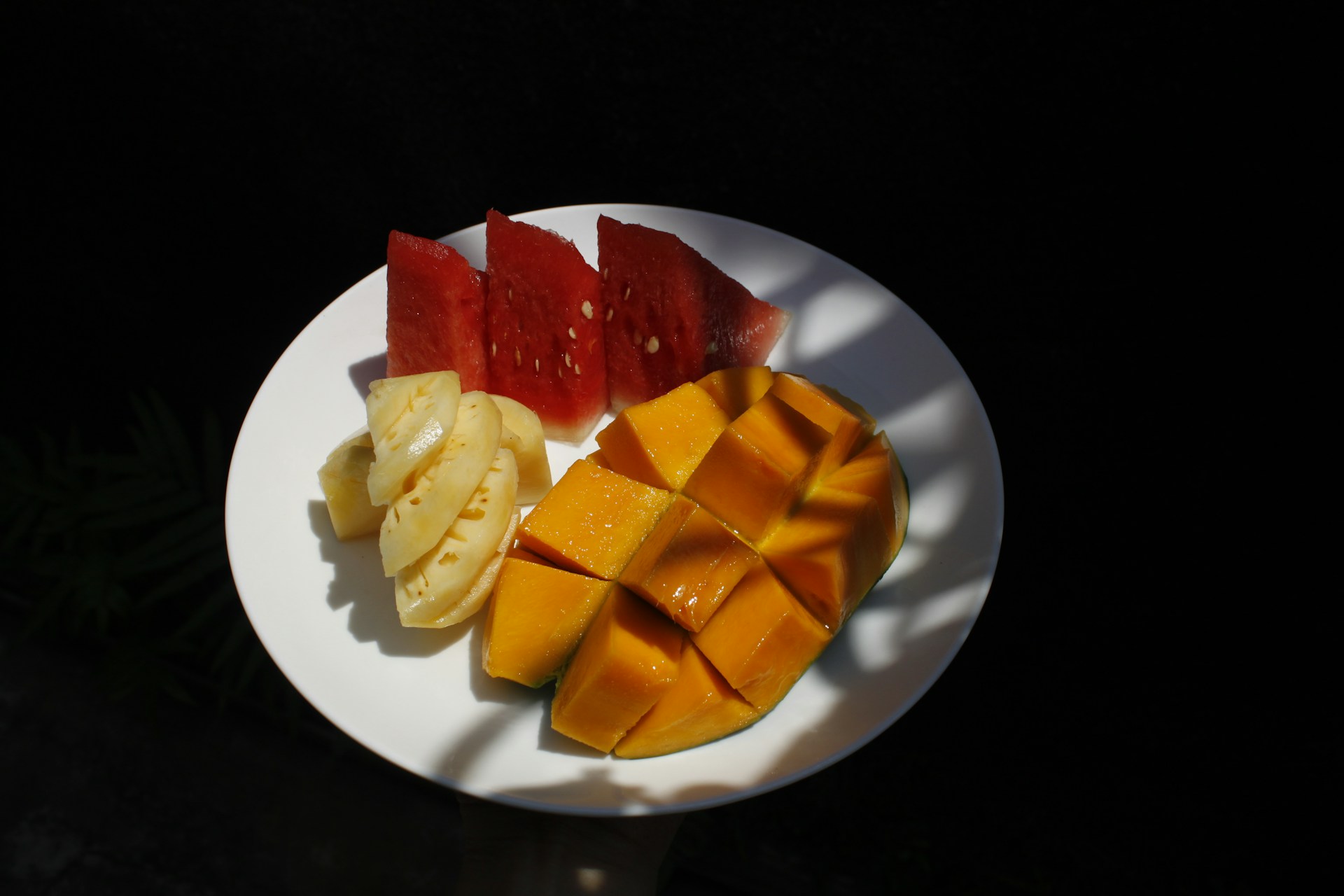Literature Review: The Effect of Mediterranean Diet on Lipid Profile and Fasting Blood Glucose in Overweight or Obese
Studi Literatur: Pengaruh Diet Mediterania terhadap Profil Lipid dan Glukosa Darah Puasa pada Orang Overweight atau Obesitas

Downloads
Background: National Basic Health Research or Riset Kesehatan Dasar in 2018 stated that obesity in Indonesia had reached 21.8%. Being overweight and obese are among the risk factors that increase various health problems, including dyslipidemia and type 2 diabetes mellitus; hence, lifestyle changes are needed, one of which is through dietary modification. The Mediterranean diet is said to improve the lipid and glucose profiles of overweight or obese people.
Objectives: This literature study aimed to determine the effect of the Mediterranean diet on lipid profiles and blood glucose levels of overweight or obese people.
Methods: This research was conducted using the literature review method on two databases that consist of Pubmed and Cochrane, with specific keywords: "Mediterranean Diet," "Obese," "Overweight," "Lipid," dan "Glucose." The inclusion criteria in this study were articles that have been through peer review and proven that the articles are credible nationally and internationally. In addition, the literature was published in the last ten years, from 2012 to 2022, with RCT research design, using English or Indonesian, >18 years old subjects classified as obese or overweight, and can be accessed online. Meanwhile, the exclusion criteria for this study were literature using pregnant women as a subject, <18 years old subjects, and a non-RCT method study.
Discussion: Mediterranean diet is a type of diet that consumes foods high in monounsaturated fatty acid, polyunsaturated fatty acid, and soluble fiber. According to the results of this literature review, these nutrients improve lipid profiles in obese and overweight people. The Mediterranean diet's antioxidant composition and low glycemic index were also found to lower fasting blood glucose levels. In addition, carbohydrate control and physical activity are associated with fluctuation in insulin sensitivity that can affect fasting blood glucose levels in obese and overweight people.
Conclusions: It was found that some literature stated that the Mediterranean diet could lower the levels of LDL, triglycerides, and total cholesterol, increase HDL levels and lower fasting blood glucose levels.
World Health Organization. Obesity and overweight. (2018). Available at: http://www.who.int/news-room/factsheets/detail/obesity-and-overweight. (Accessed: 28th September 2021).
Health Research and Development Agency, Ministry of Health, Republic of Indonesia. RISKESDAS National Report 2018. (2018). Available at: https://dinkes.kalbarprov.go.id/wp-content/uploads/2019/03/Laporan-Riskesdas-2018-Nasional.pdf. (Accessed: 28th September 2021)
Frühbeck, G., Méndez-Giménez, L., Fernández-Formoso, JA, Fernández, S. & Rodriguez, A. regulation of adipocyte lipolysis. Nutrition Research Reviews. 27, 63–93 (2014).
Jiménez, JM et al. Changes in lipid profile, body weight variables and cardiovascular risk in obese patients undergoing one gastric bypass anastomosis. International Journal of Environmental Research and Public Health. 17, 5858 (2020).
Romagnolo, DF, Selmin, OI Mediterranean diet and prevention of chronic diseases. Nutr. today. 52, 208-222 (2017).
Martinez-González, MA et al. Benefits of the mediterranean diet: Insights from the {PREDIMED} study. Progress in Cardiovascular Disease. 58, 50–60 (2015).
Esposito, K., Kastorini, CM, Panagiotakos, DB & Giugliano, D. Mediterranean diet and weight loss: Meta-analysis of randomized controlled trials. Metabolic Syndrome and Related Disorders. 9, 1–12 (2011).
Mielniczek, K. The influence of the Mediterranean diet on glucose metabolism. Journal of Education, Health and Sport. 11, 430–433 (2021).
Ristic-Medic, D. et al. Calorie-restricted Mediterranean and low-fat diets affect fatty acid status in individuals with non-alcoholic fatty liver disease. Nutrients. 13, 15 (2020).
Handayani, DR & Rakhmat, II Characteristics, nutritional status, and lipid profile of dyslipidemia patients with a Mediterranean diet. AtlantisPress. 37, 10–15 (2021).
Casas, R. et al. Long-term immunomodulatory effects of a Mediterranean diet in adults at high risk of cardiovascular disease in the prevention of the Mediterranean diet in a randomized controlled trial. The Journal of Nutrition. 146, 1–10 (2016).
Venturini, D., Simí£o, ANC, Urbano, MR & Dichi, I. Effects of extra virgin olive oil and fish oil on lipid profile and oxidative stress in patients with metabolic syndrome. nutrition. 31, 834–840 (2015).
Altamimi, MA, Zidan, S. & Badrasawi, M. Effects of tree nut consumption on serum lipid profile in hyperlipidemic individuals: a systematic review. Nutrition and Metabolic Insights. 13, 1–10 (2020).
Ryan, MC et al. The mediterranean diet improves hepatic steatosis and insulin sensitivity in individuals with non-alcoholic fatty liver disease. Journal of Hepatology. 59, 138–143 (2013).
Tosti, V., Bertozzi, B. & Fontana, L. Health benefits of the Mediterranean diet: metabolic and molecular mechanisms. The Journals of Geronotology. 73, 318–326 (2018).
Bekkouche, L., Bouchenak, M., Malaisse, W. & Yahia, D. The mediterranean diet adoption improves metabolic, oxidative, and inflammatory abnormalities in algerian metabolic syndrome patients. Hormone and Metabolic Research. 46, 274–282 (2014).
Vitale, M. et al. Acute and chronic improvement in postprandial glucose metabolism by a diet resembling the traditional Mediterranean dietary pattern: Can SCFAs play a role? Clinical Nutrition. 40, 428-37. (2020).
Damasceno, NRT et al. Mediterranean diet supplemented with nuts reduces waist circumference and shifts lipoprotein subfractions to a less atherogenic pattern in subjects at high cardiovascular risk. Atherosclerosis. 230, 347–353 (2013).
Algoblan, A., Alalfi, M. & Khan, M. Mechanism linking diabetes mellitus and obesity. Diabetes, Metabolic Syndrome, and Obesity: Targets and Therapy. 587 (2014).
Karpe, F., Dickmann, JR & Frayn, KN Fatty acids, obesity, and insulin resistance: Time for a reevaluation. Diabetes. 60, 2441–2449 (2011).
Anania, C., Perla, FM, Olivero, F., Pacifico, L. & Chiesa, C. Mediterranean diet and non-alcoholic fatty liver disease. World Journal of Gastroenterology. 24, 2083–2094 (2018).
Schwingshackl, L., Strasser, B. & Hoffmann, G. Effects of monounsaturated fatty acids on glycemic control in patients with abnormal glucose metabolism: A systematic review and meta-analysis. Ann Nutr Metab. 58, 290–296 (2011).
Pellegrini, M. et al. Gut microbiota composition after diet and probiotics in overweight breast cancer survivors: a randomized open-label pilot intervention trial. nutrition. 74, 110749 (2020).
Ejtahed, HS et al. Probiotic yogurt improves antioxidant status in type 2 diabetic patients. nutrition. 28, 539–543 (2012).
Shai, I. et al. Weight loss with a low-carbohydrate, mediterranean, or low-fat diet. New England Journal of Medicine. 359, 229–241 (2008).
Tricò, D. et al. Effects of low-carbohydrate versus mediterranean diets on weight loss, glucose metabolism, insulin kinetics and beta-cell function in morbidly obese individuals. Nutrients. 13, 1345 (2021).
Salas-Salvadó, J. et al. Erratum. Reduction in the incidence of type 2 diabetes with the mediterranean diet: Results of the {PREDIMED}-Reus nutrition intervention randomized trial. DiabetesCare. 41, 2259–2260 (2011).
Copyright (c) 2023 Amerta Nutrition

This work is licensed under a Creative Commons Attribution-ShareAlike 4.0 International License.
AMERTA NUTR by Unair is licensed under a Creative Commons Attribution-ShareAlike 4.0 International License.
1. The journal allows the author to hold the copyright of the article without restrictions.
2. The journal allows the author(s) to retain publishing rights without restrictions
3. The legal formal aspect of journal publication accessibility refers to Creative Commons Attribution Share-Alike (CC BY-SA).
4. The Creative Commons Attribution Share-Alike (CC BY-SA) license allows re-distribution and re-use of a licensed work on the conditions that the creator is appropriately credited and that any derivative work is made available under "the same, similar or a compatible license”. Other than the conditions mentioned above, the editorial board is not responsible for copyright violation.












































